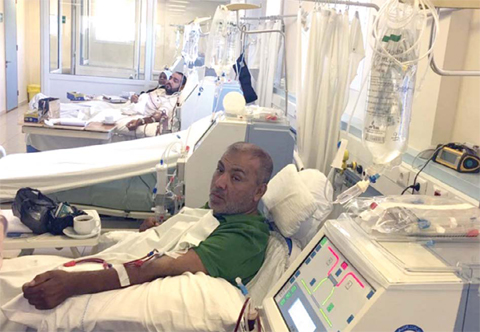 Photos show some patients at the hospital. KRCS has launched a new phase in its campaign to treat Syrian refugees suffering from kidney failure. — KUNA photos
Photos show some patients at the hospital. KRCS has launched a new phase in its campaign to treat Syrian refugees suffering from kidney failure. — KUNA photosTRIPOLI: Kuwait Red Crescent Society (KRCS) is launching a new phase in its campaign to treat Syrian refugees suffering from kidney failure and illnesses. Maha Al-Barjas, the KRCS General Secretary, said in a statement to KUNA that the new stage, due for six months, would get underway early next month. The Kuwaiti Red Crescent, in coordination with the Lebanese Red Cross, launched the project to provide medical aid for the Syrian refugees suffering from kidney problems more than two years ago.
Meanwhile, the manager of the state-run hospital in the northern city, Dr Khaled Kamal Eddine, said the KRCS aid depicted the great message by the State of Kuwait, explaining that the assistance included various equipment and devices necessary for treating the kidney patients. The KRCS has been involved, since flareup of the Syrian crisis, in various humanitarian activities to help the Syrian refugees, estimated at 1.5 million. In Lebanon’s eastern Bekaa valley, a team of the Kuwait Medical Association has conducted a number of surgeries for Syrian refugees.
The association chairman, Dr Mohammad Al-Mutairi said that the team would also carry out cardiac operations. Dr Khaled Al- Sehlawi, member of the association, said a number of ill children and elderly were examined in the refugees’ camps and were given the needed treatment. The association humanitarian campaign proceeds for three days
Kuwait Red Crescent clinic
In another development, Clinic of Kuwait Red Crescent Society in the Jordanian capital has aided thousands of Syrian refugees providing costly treatment for various illnesses and conditions, namely for pregnant women whose delivery required caesarian operations. Wife of Mustafa, one of the refugees, 11 months ago, delivered the female baby Noor after prolonged and regular examination of the mother by personnel at the Kuwait-established clinic, where equipment for such special cases are available.
Noor was one of 37 babies who came to life in caesarian operations conducted by the KRCS medical team between August and July 2015 The KRCS admitted 5,917 patients, at a daily rate of 25-30 cases since a year ago. The staff treated 5,700 cases, conducted 56 natural births, 43 operations for children, admitted eight cases that warranted intensive care and shifted 73 others to specialists. The Kuwaiti society has set up the clinic within a building of the Jordanian Red Crescent. The medical cadres started working in January 2015 for a year-long program. Value of the medical services, including dentistry, that had been provided were estimated at $84,000. The Kuwaiti association has been delivering humanitarian aid to the estimated 1.4 million Syrian refugees, hosted by Jordan, since break-out of the crisis in Syria.— Agencies










